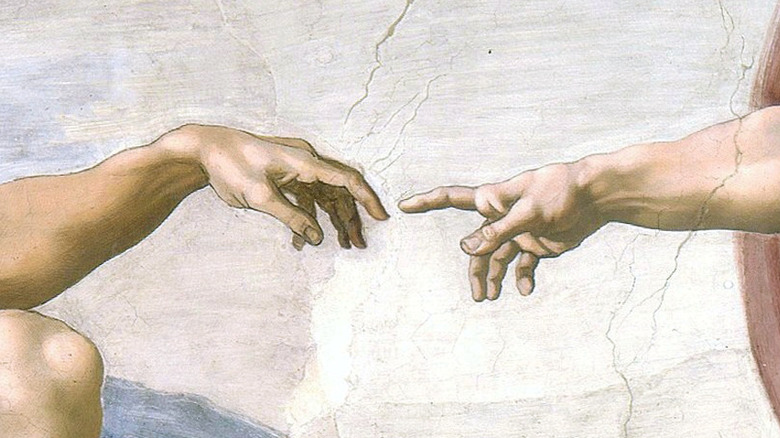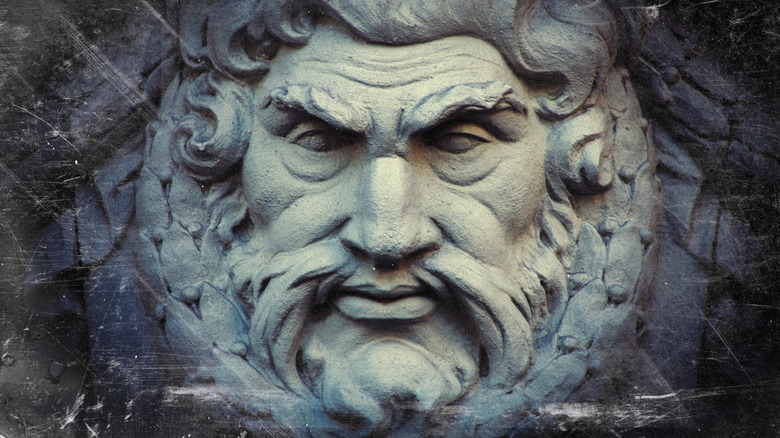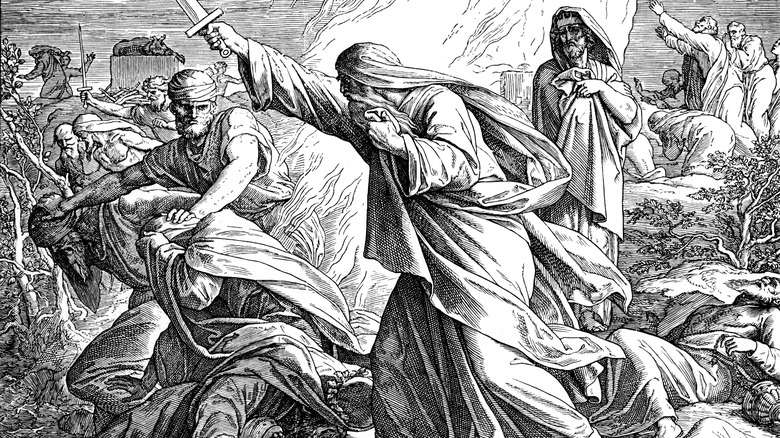Does The Bible Really Imply Other Gods Exist?
There are lots of bizarre stories in the Bible's Old and New Testaments. We've got the classic Jonah getting eaten by a whale tale, a talking donkey in Numbers, Moses' staff turning into a snake in Exodus, and the whole human-angel hybrid Nephilim thing. That last one connects to non-canonical texts like the Pseudepigrapha, which itself recounts stories like that of King Solomon's magic, demon-controlling ring. Add to this loads of different versions of both the Hebrew and Christian Bible, like the Ethiopian version that contains the Book of Enoch, books like Maccabees in the Catholic Bible, outliers like the Gospel of Judas, or just the entirety of the Dead Sea Scrolls, and it should become clear that there's no "typical" Bible — only different versions of a highly curated, architected product of textual consolidation and omittance over centuries of time.
This article doesn't exist to discuss the truth or non-truth of any of such texts. Rather, the point is to help the reader envision a time far before the coherence of supposedly long-cemented Biblical doctrine. Ancient Jews were just one Semitic tribe of many Mesopotamian peoples, like the Babylonians, Sumerians, Hittites, Assyrians, etc., all of which had deities held as closely as Judaism's. In fact, as Live Science describes, it's not quite accurate to think of Judaism as "monotheistic," but more of a way of life that happened to elevate one god — Yahweh — to chief deity status. Plenty of other gods still existed, as the Bible itself describes.
No greater gods and no statues
"You shall have no other gods before me," the first of the Bible's much-cited Ten Commandments states in the Old Testament's Book of Exodus. And in case the reader thinks these gods are limited to either non-humanoid objects or abstract concepts — like one's Lexus or being generally vain — the Second Commandment discusses physical representations of these "other gods," saying (via BibleGateway), "You shall not make for yourself an image in the form of anything in heaven above or on the earth beneath or in the waters below." Fundamentally, this second dictate means one thing: No statues of gods, aka idols, like how the ancient Egyptians made statues of gods like Osiris. So those "other gods" mentioned in the First Commandment? They existed. Followers of the commandment simply weren't supposed to put them "before" — i.e., treat them as more important than — Yahweh, or craft any related statues.
We could end the discussion about the Biblical inclusion of non-God gods right there, but there are plenty of other examples to cite. All such examples fall squarely in the pre-modern vision of a polytheistic universe, where the world was populated with countless spirits, entities, lesser gods, greater entities, and everything in between, and each was associated with various cities, tribal groups, mountains, rivers, patches of territory — you name it. All such related Mesopotamian cultures interacted and cross-pollinated with Judaism, which in turn birthed Christianity.
The heart of the Covenant
First Things has a detailed breakdown of numerous mentions of other gods in the Biblical Old Testament. The Book of Deuteronomy, for instance, mentions not hailing "the sun, the moon and the stars, all the host of heaven ... [which] Yahweh your god has allotted to all the peoples everywhere under heaven." This admonition covers the same "no other gods before me" rule laid out in the Ten Commandments and fits our historical precedent of Mesopotamian cities, tribal groups, etc., being carved up and falling under the purview of certain gods. On that note, Exodus mentions "all the gods of Egypt," and later in Numbers describes how "Yahweh executed judgments against their gods."
Yahweh's role as protector and war chief was ideal for ancient Jews. After breaking off from the Mesopotamian city of Ur about 1,900 B.C.E., the Jewish people became nomadic wanderers and herders, as "Western Civilization: A Concise History" describes. They were in need of some entity who stayed with them, watched over them, and guided their lives — that is, so long as they prioritized this entity, i.e., upheld their "Covenant" with it. This is why large chunks of the Old Testament describe how to conduct ritual, sacrificial killings of livestock to satisfy said Covenant, and other swathes recount battle after battle where Yahweh heads up the destruction of neighboring peoples. In none of these instances is it remotely suggested that other gods don't exist. In fact, it's because they do exist that the Covenant exists at all.


